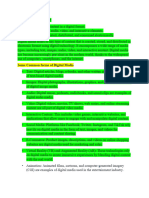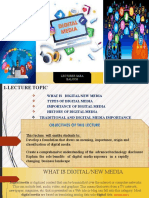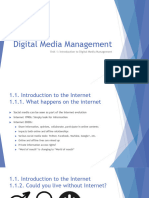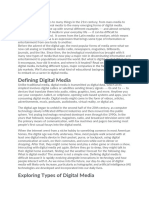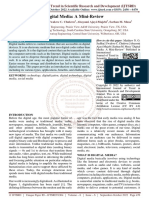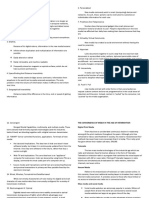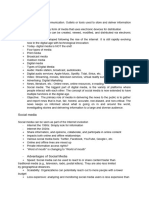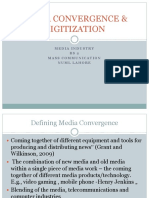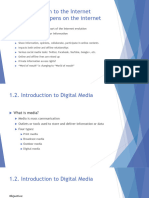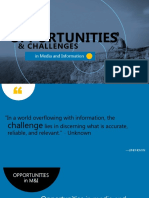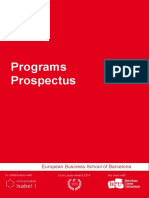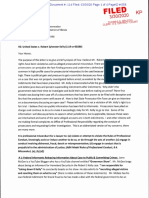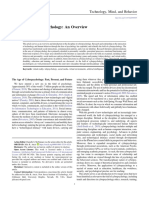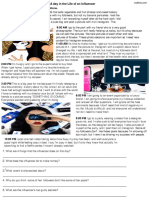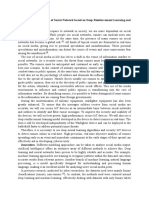MIUK2DSCJMC152.
1 DIGITAL MEDIA DYNAMICS MAR IVANIOS COLLEGE
Digital Media Dynamics
Unit I: Introduction to Digital Media
I. Understanding Digital Media: Definitions and Characteristics
Definition
Digital media refers to any content that is created, stored, and distributed in a digital format,
accessible through electronic devices. It includes text, images, audio, video, and interactive
media.
Characteristics of Digital Media
1. Interactivity: Users can actively engage with content rather than just passively consuming
it (e.g., social media, websites with comment sections).
2. Multimodality: Combines different types of media, such as text, images, and videos, to
create richer content (e.g., an online news article with embedded videos and
infographics).
3. Connectivity: Enables instant global communication through the internet (e.g., live
streaming, social networking).
4. Storage and Accessibility: Digital content can be stored on devices and cloud platforms
and accessed anytime (e.g., Google Drive, Dropbox).
5. Real-time Updates: Content can be modified instantly and redistributed (e.g., Wikipedia,
online newspapers).
6. Personalization: Algorithms help deliver customized content based on user preferences
(e.g., YouTube recommendations, personalized news feeds).
Example:
A newspaper article printed in hard copy vs. an online news portal that updates news in real
time, integrates videos, and allows comments.
II. Historical Overview of Digital Media Evolution
Early Digital Media (1960s-1980s)
• 1960s: ARPANET, the precursor to the internet, was developed for military and
academic communication.
• 1970s: The first personal computers (e.g., Apple I, IBM PC) introduced digital word
processing and graphics.
• 1980s: The invention of CDs and digital photography marked the shift from analogue to
digital storage.
Rise of the Internet (1990s)
• 1991: Tim Berners-Lee introduced the World Wide Web (WWW), allowing for
hypertext-based information sharing.
• Mid-1990s: The rise of search engines (Yahoo!, Google), email (Hotmail), and the first
websites.
EIPE, J J 1
�MIUK2DSCJMC152.1 DIGITAL MEDIA DYNAMICS MAR IVANIOS COLLEGE
• Late 1990s: E-commerce began with platforms like Amazon and eBay.
Social Media and Web 2.0 (2000s)
• 2000s: Blogging platforms (WordPress, Blogger) allowed user-generated content.
• 2004: Facebook launched, changing how people interact digitally.
• 2005: YouTube introduced video-sharing capabilities.
• 2007: The smartphone revolution, led by the iPhone, increased mobile internet
consumption.
Modern Digital Media (2010s-Present)
• 2010s: Streaming services (Netflix, Spotify), live streaming (Twitch), and short-form
video content (TikTok) gained popularity.
• 2020s: AI-generated content, virtual reality (VR), and blockchain-based media (NFTs,
decentralized web) emerged.
Example:
Traditional print encyclopaedias (like Britannica) were replaced by Wikipedia, an online,
constantly updated source of knowledge.
III. Digital Media Platforms: Social Media, Websites, Blogs, and Forums
Social Media
Definition: Platforms that allow users to create, share, and interact with digital content.
Examples: Facebook, Instagram, Twitter, LinkedIn.
Uses: Marketing, personal branding, news distribution, and community engagement.
Websites
Definition: A collection of web pages accessible via a URL.
Types:
Corporate Websites: Used for branding and communication (e.g., Apple.com).
E-commerce Websites: Sell products online (e.g., Amazon, Flipkart).
Portfolio Websites: Showcase work (e.g., a photographer’s site).
Blogs
Definition: Regularly updated web pages written in an informal style.
Examples: Medium, WordPress blogs.
Uses: Opinion pieces, educational content, tutorials.
Forums
Definition: Online discussion platforms where users post questions and receive answers.
Examples: Reddit, Quora, Stack Overflow.
Uses: Knowledge sharing, troubleshooting, online debates.
Example:
EIPE, J J 2
�MIUK2DSCJMC152.1 DIGITAL MEDIA DYNAMICS MAR IVANIOS COLLEGE
A company can use social media for marketing (Facebook Ads), a website for official
information, a blog for thought leadership, and forums to address customer queries.
IV. Ethical and Legal Considerations in Digital Media
Privacy Concerns
Issue: Companies collect user data without consent.
Examples: Facebook-Cambridge Analytica scandal, targeted advertising using cookies.
Solutions: Data protection laws (GDPR), user-controlled privacy settings.
Copyright and Intellectual Property
Issue: Unauthorized use of copyrighted material.
Examples: Piracy of movies, uncredited images in blog posts.
Solutions: Licensing (Creative Commons), Digital Millennium Copyright Act (DMCA).
Fake News & Misinformation
Issue: Spread of false information leading to social harm.
Examples: Deepfake videos, fake election news.
Solutions: Fact-checking tools (Snopes, PolitiFact), AI-based fake news detection.
Cybersecurity
Issue: Digital content is vulnerable to hacking and phishing attacks.
Examples: Data breaches at major corporations, phishing emails.
Solutions: Two-factor authentication (2FA), encryption.
Regulatory Frameworks
General Data Protection Regulation (GDPR): Protects user data in the EU.
Digital Millennium Copyright Act (DMCA): Addresses online copyright infringement.
Communications Decency Act (CDA) 230 (US): Protects online platforms from liability for user-
generated content.
Example:
If a YouTube user uploads a copyrighted movie, the video is flagged and removed under DMCA
guidelines.
Additional Reading Material
Books:
1. Understanding Digital Culture – Vincent Miller
2. The Medium is the Message – Marshall McLuhan
3. New Media: A Critical Introduction – Martin Lister et al.
4. The Social Media Bible: Tactics, Tools, and Strategies for Business Success – Lon Safko
Online Courses:
EIPE, J J 3
�MIUK2DSCJMC152.1 DIGITAL MEDIA DYNAMICS MAR IVANIOS COLLEGE
1. Coursera - Introduction to Digital Media (https://www.coursera.org/learn/digital-media)
2. edX - Digital Media and Society (https://www.edx.org/course/digital-media-and-society)
3. Udemy - Social Media Marketing Mastery(https://www.udemy.com/course/social-media-
marketing-mastery-2023/)
Websites:
1. Pew Research Center - Digital Media Trends (https://www.pewresearch.org/topics/digital-
media/)
2. Harvard Law Review - Digital Media Ethics (https://harvardlawreview.org/)
3. BBC Academy - Journalism and Digital Media
(https://www.bbc.co.uk/academy/en/collections/digital-journalism)
EIPE, J J 4
